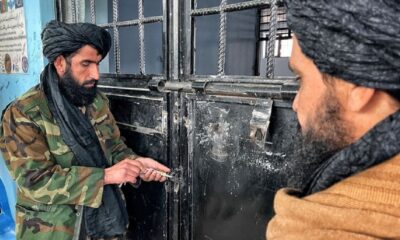Health
Bayat Group launches aggressive public health campaign – Coronavirus

The Bayat Group has launched an aggressive public health campaign – Stop The Virus (STV) – aimed to help Afghanistan to fight the novel Coronavirus.
The Bayat Group, one of Afghanistan’s largest private companies, and its two largest operating entities – Afghan Wireless Communications Company (AWCC), Ariana Television and Radio (ATN) – and Bayat Foundation have launched the nationwide public health initiative, which is disinfecting the cities and providing Afghans with essential information on how to protect themselves from contracting COVID-19.
 In a statement released on Tuesday, April 14, the Bayat Group said that it launched the campaign in March in partnership with the Afghan Ministry of Public Health.
In a statement released on Tuesday, April 14, the Bayat Group said that it launched the campaign in March in partnership with the Afghan Ministry of Public Health.
According to the statement the Bayat Group has also initiated public disinfection activities in many districts and public health facilities in Kabul and Kandahar in early April.
“COVID-19 is Afghanistan’s most serious health challenge in decades — and we’re determined to do everything possible to stop this virus from infecting more Afghans,” said Dr. Ehsan Bayat, the Founder and Chairman of The Bayat Group.
The organization has planned to expand the campaign throughout Afghanistan including in Herat, Nangahar, Balkh, Kandahar, and Kunduz Provinces.
“Working in partnership with The Afghan Ministry of Public Health, we’re expanding our Stop The Virus public health and education campaign throughout Afghanistan,” Dr. Bayat added.
“The Bayat Group and The Bayat Foundation will never relent in our long-term efforts to expand Afghanistan’s network of hospitals and medical clinics,” Dr. Bayat noted.
The Bayat Group’s leadership, and AWCC’s and ATN’s multi-faceted program to stop the spread of COVID-19, has been eagerly welcomed by H.E. Dawood Sultanzoy, the Mayor of Kabul City, together with many other public officials throughout Afghanistan.
Meanwhile, the Bayat Group and AWCC also distributed information about how to Stop The Virus to millions of Afghans, via the AWCC and ATN websites, Facebook, Twitter and SMS messages to AWCC’s 5,000,000 subscribers and ATN’s social media followers. This messaging — which was also made available in informational brochures as well as via regular television and radio Public Service Announcements (PSAs) — contained simple, easily-implemented recommendations for preventing the spread of COVID-19, including:
- Frequent hand washing, with soap and water
- Avoidance of close contact with others, by staying home as much as possible and keeping at least six feet apart from people (Social Distancing)
- Wearing masks or other face coverings when in the presence of others
- Covering coughs and sneezes
- Cleaning and disinfecting surfaces often
The STV is a powerful and compassionate example of The Bayat Group’s commitment to protect the health of Afghans.
“This is just another step in our journey to help give all Afghans to have access to healthcare that keeps them strong, healthy and able to build better lives.”
Dr. Ehsanollah Bayat underscored.
It comes as 70 new positive cases of COVID-19 have been registered in Afghanistan – Kabul 31, Herat 22, Kandahar 3, Ghazni 3, Maidan Wardak 2, Kunar 2, Nangarhar 2, Nimruz 2, Faryab1, Urozgan 1 and Baghlan 1 – bringing the total affected to 784 with 25 deaths and 40 recoveries, the Ministry of Public Health confirms.
Since 2006, The Bayat Group and The Bayat Foundation, Afghanistan’s largest charitable Foundation, have completed 500 projects to improve the health of Afghans, including the construction of fourteen hospitals that have provided life-saving medical treatment to 3,000,000 people.
Click here to download the press release!
Health
Global organizations warn of health crisis due to aid cuts in Afghanistan

Global organizations are raising alarms about the impact of aid cuts on Afghanistan’s health sector and the reduction in funding for humanitarian organizations operating in the country.
UN-affiliated bodies have stated that the complete suspension of aid from the United States and the reduction of the 2025 budget could lead to the closure or suspension of nearly 2,000 healthcare centers across Afghanistan.
The United Nations Office for the Coordination of Humanitarian Affairs (OCHA) has further warned that if only 25 percent of the required funding is provided, 7 million out of the 9.3 million people in need of medical services will be left without access to healthcare.
The report highlights that without immediate and sufficient funding, child mortality rates could rise sharply, as malnutrition remains one of the leading causes of death for children under the age of five.
The World Food Programme (WFP) has also warned that Afghanistan is facing a severe malnutrition crisis among children, with the number of malnourished children expected to reach 3.5 million by 2025.
Recent reports from the WFP reveal that 8 out of 10 families in Afghanistan are unable to afford a sufficient diet, and 3 out of 4 families are being forced to borrow money to purchase basic food items.
UN agencies have stressed the urgent need for the international community to address the humanitarian crisis in Afghanistan and provide the necessary aid.
This comes after Afghanistan’s Ministry of Economy dismissed reports from some international organizations about the growing poverty in the country, labeling them as exaggerated and far from reality.
Health
Health minister meets with Qatari envoy over building of 400-bed hospital in Kandahar

The Ministry of Public Health has announced that Noor Jalal Jalali, the acting public health minister, met with Murdif Al-Qashouti, the Chargé d’Affaires of the Qatari Embassy in Kabul, to discuss the construction of a planned 400-bed hospital by Qatar, the provision of equipment for hospitals, and the enhancement of the capacity of health workers in Kandahar province.
According to a statement, the Acting Minister of Public Health emphasized the importance of improving the capacity of health workers and equipping hospitals with standard facilities to better address patients’ needs and provide essential health services. He considers Qatar’s cooperation to be crucial.
In this meeting, Al-Qashouti assured the IEA of Qatar’s commitment to supporting various health sectors in Afghanistan.
In November 2023, the Ministry of Public Health had announced that Qatar planned to build a 400-bed hospital in Kandahar. In September 2023, reports also emerged about Qatar Charity’s commitment to constructing this hospital.
However, Qatar has not yet started the actual construction of the hospital.
International organizations have repeatedly warned that attention must be given to Afghanistan’s health system, as the country cannot effectively manage patients and combat infectious diseases such as polio and tuberculosis without the support of global organizations.
Health
Majority of WHO-supported facilities in Afghanistan risk shutdown by June
As of 4 March 2025, 167 health facilities had shut down due to funding shortages, cutting off lifesaving medical care to 1.6 million people
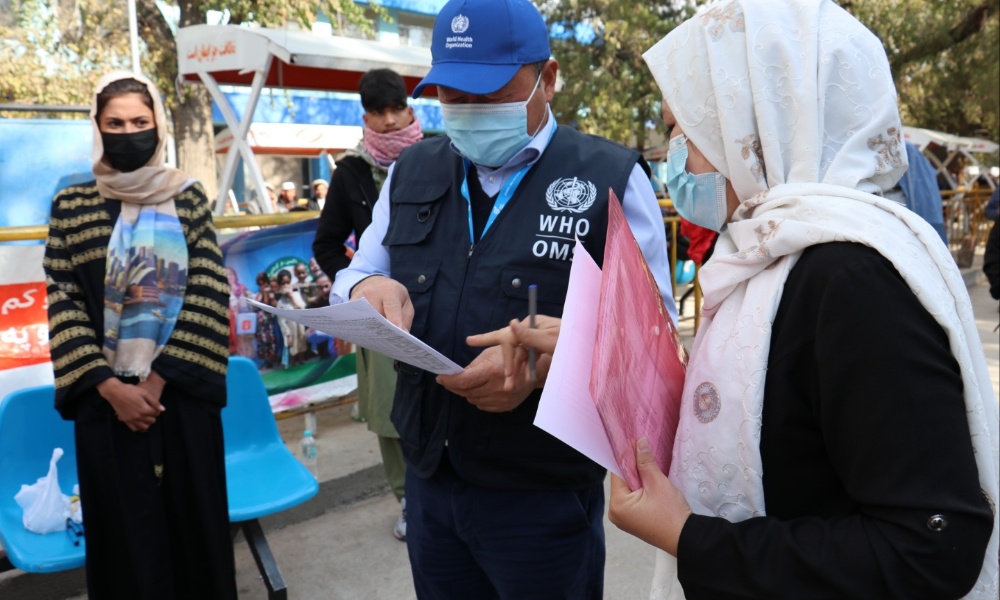
The World Health Organization (WHO) in Afghanistan is deeply concerned that funding shortages could force the closure of 80 percent of WHO-supported essential health care services across the country.
Millions of people, including vulnerable populations such as women, children, the elderly, the displaced and returnees, will be left without access to critical medical care, the organization said in a statement.
As of 4 March 2025, 167 health facilities had shut down due to funding shortages, cutting off lifesaving medical care to 1.6 million people across 25 provinces.
WHO warned that without urgent intervention, another 220 facilities could close by June 2025, leaving an additional 1.8 million Afghans without access to primary health care.
In the worst affected regions – Northern, Western and Northeastern Afghanistan – more than a third of health care centres have shut down, raising alarms about an imminent humanitarian crisis.
“These closures are not just numbers on a report, they represent mothers unable to give birth safely, children missing lifesaving vaccinations, entire communities left without protection from deadly disease outbreaks,” said WHO Representative and Head of Mission in Afghanistan Dr Edwin Ceniza Salvador.
“The consequences will be measured in lives lost.”
Afghanistan is already battling multiple health emergencies, including outbreaks of measles, malaria, dengue, polio and Crimean-Congo haemorrhagic fever.
Without functioning health facilities, efforts to control these diseases are severely hindered. Over 16 000 suspected measles cases, including 111 deaths, were reported in the first two months of 2025. With immunization rates at critically low levels (only 51% for the first dose of the measles vaccine and 37% for the second), children are at heightened risk of preventable illness and death.
While some donors continue to support Afghanistan’s health sector, funding has been significantly reduced as development aid priorities have shifted. The needs, however, remain immense, and current support is not enough to sustain critical health care services for millions of Afghans, WHO stated.
“This is not just about funding. It is a humanitarian emergency that threatens to undo years of progress in strengthening Afghanistan’s health system,” said Salvador.
“Every day that passes without our collective support brings more suffering, more preventable deaths and lasting damage to the country’s health care infrastructure.”
-
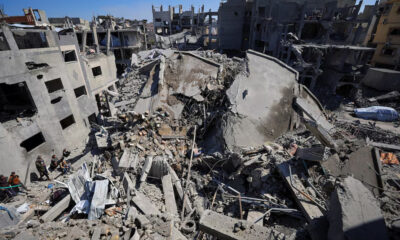
 Regional5 days ago
Regional5 days agoEgypt makes new proposal to restore Gaza truce as Israeli strikes kill 65
-

 International Sports5 days ago
International Sports5 days agoIPL 2025: Last over drama; Ashutosh Sharma clinches win for Delhi Capitals
-

 Sport5 days ago
Sport5 days agoAfghanistan eliminated from Asian Beach Soccer Championship
-
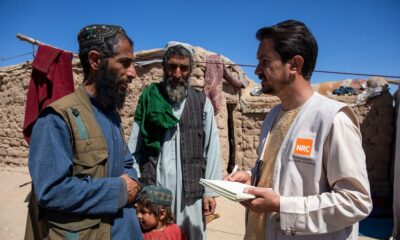
 Latest News5 days ago
Latest News5 days agoNorwegian Refugee Council cuts back on essential humanitarian services in Afghanistan
-
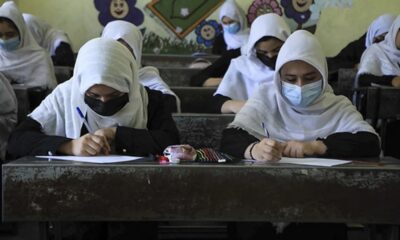
 Latest News5 days ago
Latest News5 days agoUN warns over 4 million Afghan girls will be deprived of education by 2030 if ban continues
-

 World4 days ago
World4 days agoSecretive Chinese network tries to lure fired US federal workers, research shows
-
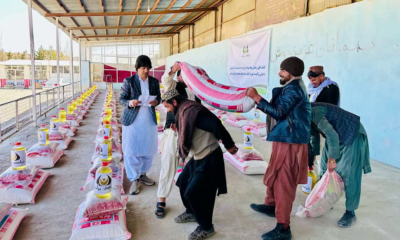
 Latest News4 days ago
Latest News4 days agoDozens of needy families in Ghazni get much needed food aid from Bayat Foundation
-

 Sport4 days ago
Sport4 days agoAFC Asian Cup 2027 Qualifiers: Myanmar defeat Afghanistan 2-1











